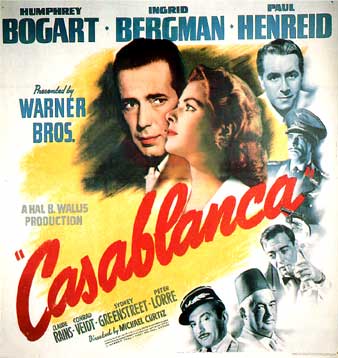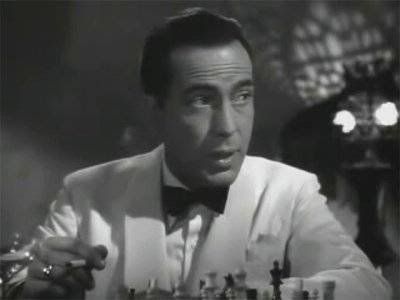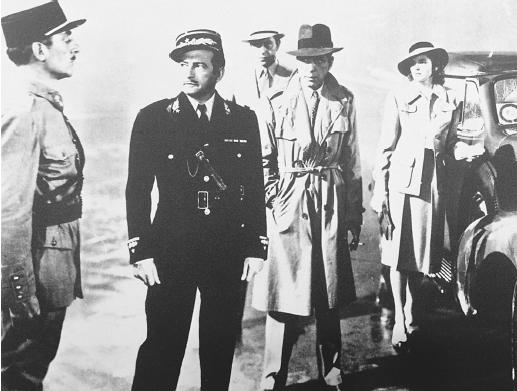Smoking is now associated on the “Silver Screen” right up there with violence, language, nudity and drug abuse in ranking criteria. The MPAA brass are quoted saying “ There is a broad awareness of smoking as a unique public health concern due to nicotine’s highly addictive nature and no parent want their child to take up the habit.”
Apparently studies prove depictions of smoking in the movies have made children more likely to try cigarettes. The Attorneys General in 32 States have publicly called on the MPAA to put “R” ratings on movies containing scenes involving smoking.
The irony is that Casablanca is an anti-fascist movie, and of course anti-smoking laws are the moralist equivalent of fascism, since they are appeals to a prohibitionist state.
Meanwhile, we also learn about Rick’s life before he came to
Casablanca. He grew up during the Prohibition years, when
selling alcohol was illegal in America. Powerful gangsters ruled
New York at this time, bringing alcohol in from outside the country
and supplying it to clubs. The young Rick is given a job by one of
these gangsters, Solly Horowitz. Solly likes Rick and makes him
manager of the Tootsie-Wootsie, a gambling and drinking club.
But trouble breaks out between rival gangsters. Rick’s boss is
killed. Rick has to get away fast. He and Sam, his pianist from the
Tootsie-Wootsie, escape to Europe.
However, if we look beyond the nostalgia and the sentimental theme of lost love and redemption, we see that Casablanca actually presents a complex and intricate political and social commentary on the early days of World War II. The product of a decade when studios were routinely producing “a movie a week,” Casablanca surpasses its humble origins as “just another Warner Brothers’ picture” by exploiting wartime patriotism and the traditional “American values” of freedom, liberty, and equality to shape audiences’ perception of the war. In the most basic sense, Casablanca was an anti-fascist propaganda vehicle which was designed to support U.S. participation in the Allied Forces’ struggle for global justice and democracy at a time when most Americans believed that U.S. foreign policy should have promoted isolationism and neutrality.
I guess I take inspiration from this heroic failure, in the battle against the anti-smoking statists.With the coming of the Second World War, for which the civil war was a rehearsal, things changed. In the 1943 Ealing Studio tributes to the army in the Western Desert, Nine Men, and to the firefighters of the London blitz, The Bells Go Down, heroic figures are identified as veterans of the International Brigades.
That same year in Hollywood, Paramount filmed Hemingway's For Whom the Bell Tolls, the greatest novel about the war, and Warner Brothers allowed Rick Blaine in Casablanca to include on his CV his services to the Loyalist cause.
Richard "Rick" Blaine - Played by Humphrey Bogart The owner of Rick's Café Americain and the film's protagonist. When we first meet Rick, he is a jaded bar owner in Casablanca who wears a dour expression as he drinks and plays chess alone. He constantly proclaims his freedom from all bonds, be they political or personal. After Ilsa enters the picture, he undergoes a considerable change. In a flashback, we see Rick in Paris. He is in love with Ilsa and visibly happy, and he is devastated when she doesn't show up at the train station. Rick never turns back into the lighthearted lover he was in Paris, but he does overcome his cynicism and apathy to become a self-sacrificing idealist, committed to helping the Allied cause in World War II.
The capitaine tells Rick that while many exit visits are sold at Café Americain he knows that Rick has never sold them and that is why he is permitted to stay open. Rick replies that he thought it was because he lets him win at roulette. The capitaine tells Rick that Victor Lazlo, a famous resistance leader from Czechoslovakia who has escaped three times from the Nazis, will be arriving shortly but that he will not be permitted to leave Casablanca. Rick suggests a 20,000-franc bet on whether Lazlo will get out of Casablanca, but the capitaine agrees only to a 10,000-franc bet, stating that he is "only a poor corrupt official." The capitaine also tells Rick that Lazlo is travelling with a very beautiful woman and tells Rick that he suspects that "under that cynical shell" Rick is a sentimentalist as he is familiar with Rick's having supplied guns to Ethiopia when that country was invaded by Italy in 1935 and with his fighting the Loyalist government the next year in the Spanish Civil War.
Heroic failure describes a person or group failing to accomplish their goal, but somehow gaining the moral upper hand or becoming ennobled in the attempt.The film Casablanca mentions two heroic failures to develop the Humphrey Bogart character Rick Blaine.
- "Oh, laugh if you will, but I happen to know your record. Let me point out just two items. In 1935 you ran guns to Ethiopia. In 1936, you fought in Spain on the Loyalist side.[1]
The first reference is to the Second Italo-Abyssinian War. In September 1935 Italy invaded Ethiopia. Ethiopia lost, but opponents of colonialism and fascism supported their cause. The second reference describes the Spanish Civil War in which rebels led by Francisco Franco gained control of the country. "The Loyalist side" refers to supporters of the losing republic. Thus Rick has fought for the causes of freedom and democracy and earned an admirable (although losing) record.
And so inspired by the great classic of anti-fascism and anti-prohibition we say here's looking at ya kid.
We have much to learn from the characters of Casablanca: in the final scene the airport is dark, the drone of the airplane fills the air and fearless, they venture out into the fog. Into the unexpected.

















See:
Rememberance or Revisionism
Kenney is A Funny Guy
Christy Moore - Viva La Quince Brigada
Find blog posts, photos, events and more off-site about:
ASH, smokers, smoking, anti-smoking, smokers-rights, Cancer, Women, Breast, Cancer, Smoking,BC,Crematorium,funeral, Anti-Smoking, cancer smoking, lung-cancer,
surgeon-general, second-hand-smoke, smoking-ban, smoking-at-home, US, children&second-hand-smoke,
smoking, anti-smoking, bylaws, laws, landlords
Canada
smoking
smokers rights
anti-smoking
ASH
6 comments:
"The irony is that Casablanca is an anti-fascist movie"
You must be kiddin'. Someone is "getting sentimental" about Warner Brothers junk?
I can't stand the overkill of anti-smoking sentiment either (as if there are no real problems), but countering this sentiment with other junk, I really don't see the point.
Hello Eugene,
I agree that the theme of Casablanca is generally anti-fascist but at the same time it is right "in there" with the Popular Front atmosphere of the times. But I'll still have to read "As Time Goes By" when I get the chance. [I hope no one tries for a remake though. As limited as the film industry was in 1942 it was angelic in comparison to the horrors of today's Hollywood.] For instance why is the role of one person, Victor Lazlo, so important to the resistance in Czechoslovakia (as it was called then) or in France? There is a bit too much emphasis on individual heroics, although the characters have some intensity and humour. I DID like the scene of people in the bar singing La Marseillaise. Actually this song was the original music for L'Internationale. The original French was written in 1870 by Eugène Pottier (1816–1887), later a member of the Commune. Pierre Degeyter (1848–1932) set the poem to music in 1888 and his melody became widely used soon after.
Erik, when they begin the Stalinist revisionism of old movies to remove the smoking, as was once suggested,scenes Casablanca will be virtually Rickless.
Werner I thought the scene of the popular resistance in the bar where upon the folks sing the Marsellaise in response to the fascists singing Deutchland Deutchland Uber Alles, a rip off of Beetoven, moved the movie beyond its individualistic sentiment.
And good point about the Internationale.
According to wikipedia ( which I admit is not always accurate ) is the point that the song being sung by the fascists is called Die Wacht am Rhein which dates from the Franco-Prussian war.
The melody of the German national anthem, which is quite easy to play on any instrument, comes from the old Austrian imperial anthem “Gott erhalte Franz den Kaiser” (“God Save Franz the Emperor”) by Franz Joseph Haydn, which was first played on February 12, 1797. In 1841 Haydn's melody was combined with with lyrics by August Heinrich Hoffmann von Fallersleben to create “Das Lied der Deutschen” or “Das Deutschlandlied.” From the time of Bismarck's Prussia (1871) up to the end of the First World War this anthem was replaced by another. In 1922 the first president of the German Republic (the “Weimar Republic”), Friedrich Ebert, officially introduced “Das Lied der Deutschen” as the national anthem. During the 12 years of the Nazi era, the first stanza was the official anthem. In May 1952 the third stanza was proclaimed the official anthem of the Federal Republic of Germany (West Germany) by President Theodor Heuss. (East Germany had its own anthem.) The second verse, while never verboten, was not very popular because of its “wine, women, and song” theme.
Post a Comment